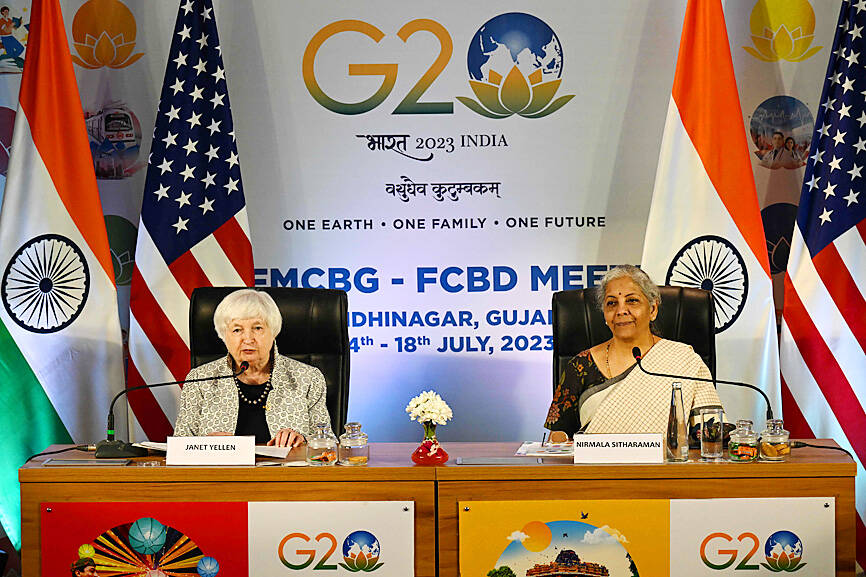G20 finance ministers and central bank chiefs yesterday opened talks on debt restructuring deals, multilateral bank reform and finance to tackle climate change, as they aim to bolster a sagging global economy.
Indian Minister of Finance Nirmala Sitharaman, chair and host of the summit in Gandhinagar, began by telling finance leaders of “the responsibility we have ... to steer the global economy towards strong, sustainable, balanced and inclusive growth.”
Key on the two-day agenda would be “facilitating consensus to intractable issues associated with rising indebtedness,” Sitharaman said earlier in the day, speaking to reporters alongside US Secretary of the Treasury Janet Yellen.

Photo: AFP
Talks would also focus on “critical global issues such as strengthening the multilateral development banks and taking coordinated climate action,” Sitharaman added.
“The world is looking to the G20 to make progress on key challenges like climate change and pandemics as part of our work to strengthen the global economy,” Yellen said.
She also cited work to tackle debt distress among the world’s poorest countries, pointing to debt restructuring progress in Zambia, which she had discussed when visiting Beijing this month.
China, the world’s second-largest economy and a major lender to several stressed, low-income countries in Asia and Africa, has so far resisted a common multilateral understanding on the issue, officials said.
Yellen on Sunday said that the Zambia deal had taken “too long to negotiate,” adding that she hoped debt treatments for Ghana and Sri Lanka could be “finalized quickly.”
“We should apply the common principles we agreed to in Zambia’s case in other cases, rather than starting at zero every time,” Yellen said. “And we must go faster.”
More than half of all low-income countries are near or in debt distress, double the case in 2015, she added.
A top official from G20 chair India said there had been a “not so encouraging response” from Beijing on shared debt understanding.
The G20 members would also discuss multilateral development banks’ reform, cryptocurrency regulations, and making access to financing to mitigate and adapt to the effects of climate change easier.
“In the Global North, climate change means emissions reductions,” World Bank president Ajay Banga wrote in an op-ed ahead of the meeting.
“But in the Global South, it is a matter of survival, because hurricanes are stronger, heat-resistant seeds are in short supply, drought is destroying farms and towns, and floods are washing away decades of progress,” he wrote.
A newly agreed first step on a fairer distribution of tax revenues from multinational firms reached by 138 countries last week is also set to be delivered.
Multinationals, especially tech firms, are able to shift profits easily to countries with low tax rates even though they carry out only a small part of their activities there.
There is also concern that developed G7 member countries’ focus on Russia’s invasion of Ukraine might derail a final consensus agreement, although Yellen has said she would “push back” on criticism that there was a trade-off between aid to Kyiv and developing nations.
Japanese Minister of Finance Shunichi Suzuki on Sunday “reconfirmed the G7’s unshakeable support” to Ukraine, adding that Moscow should also “pay long-term reconstruction costs.”
Any discussion on Ukraine is awkward for India, which has not condemned Russia’s invasion, but is also part of the Quadrilateral Security Dialogue alongside Australia, the US and Japan.

Intel Corp chief executive officer Lip-Bu Tan (陳立武) is expected to meet with Taiwanese suppliers next month in conjunction with the opening of the Computex Taipei trade show, supply chain sources said on Monday. The visit, the first for Tan to Taiwan since assuming his new post last month, would be aimed at enhancing Intel’s ties with suppliers in Taiwan as he attempts to help turn around the struggling US chipmaker, the sources said. Tan is to hold a banquet to celebrate Intel’s 40-year presence in Taiwan before Computex opens on May 20 and invite dozens of Taiwanese suppliers to exchange views

Application-specific integrated circuit designer Faraday Technology Corp (智原) yesterday said that although revenue this quarter would decline 30 percent from last quarter, it retained its full-year forecast of revenue growth of 100 percent. The company attributed the quarterly drop to a slowdown in customers’ production of chips using Faraday’s advanced packaging technology. The company is still confident about its revenue growth this year, given its strong “design-win” — or the projects it won to help customers design their chips, Faraday president Steve Wang (王國雍) told an online earnings conference. “The design-win this year is better than we expected. We believe we will win

Chizuko Kimura has become the first female sushi chef in the world to win a Michelin star, fulfilling a promise she made to her dying husband to continue his legacy. The 54-year-old Japanese chef regained the Michelin star her late husband, Shunei Kimura, won three years ago for their Sushi Shunei restaurant in Paris. For Shunei Kimura, the star was a dream come true. However, the joy was short-lived. He died from cancer just three months later in June 2022. He was 65. The following year, the restaurant in the heart of Montmartre lost its star rating. Chizuko Kimura insisted that the new star is still down

While China’s leaders use their economic and political might to fight US President Donald Trump’s trade war “to the end,” its army of social media soldiers are embarking on a more humorous campaign online. Trump’s tariff blitz has seen Washington and Beijing impose eye-watering duties on imports from the other, fanning a standoff between the economic superpowers that has sparked global recession fears and sent markets into a tailspin. Trump says his policy is a response to years of being “ripped off” by other countries and aims to bring manufacturing to the US, forcing companies to employ US workers. However, China’s online warriors